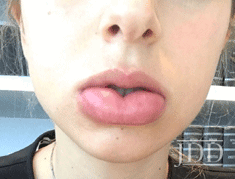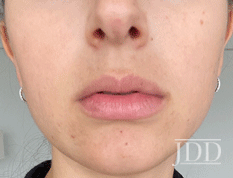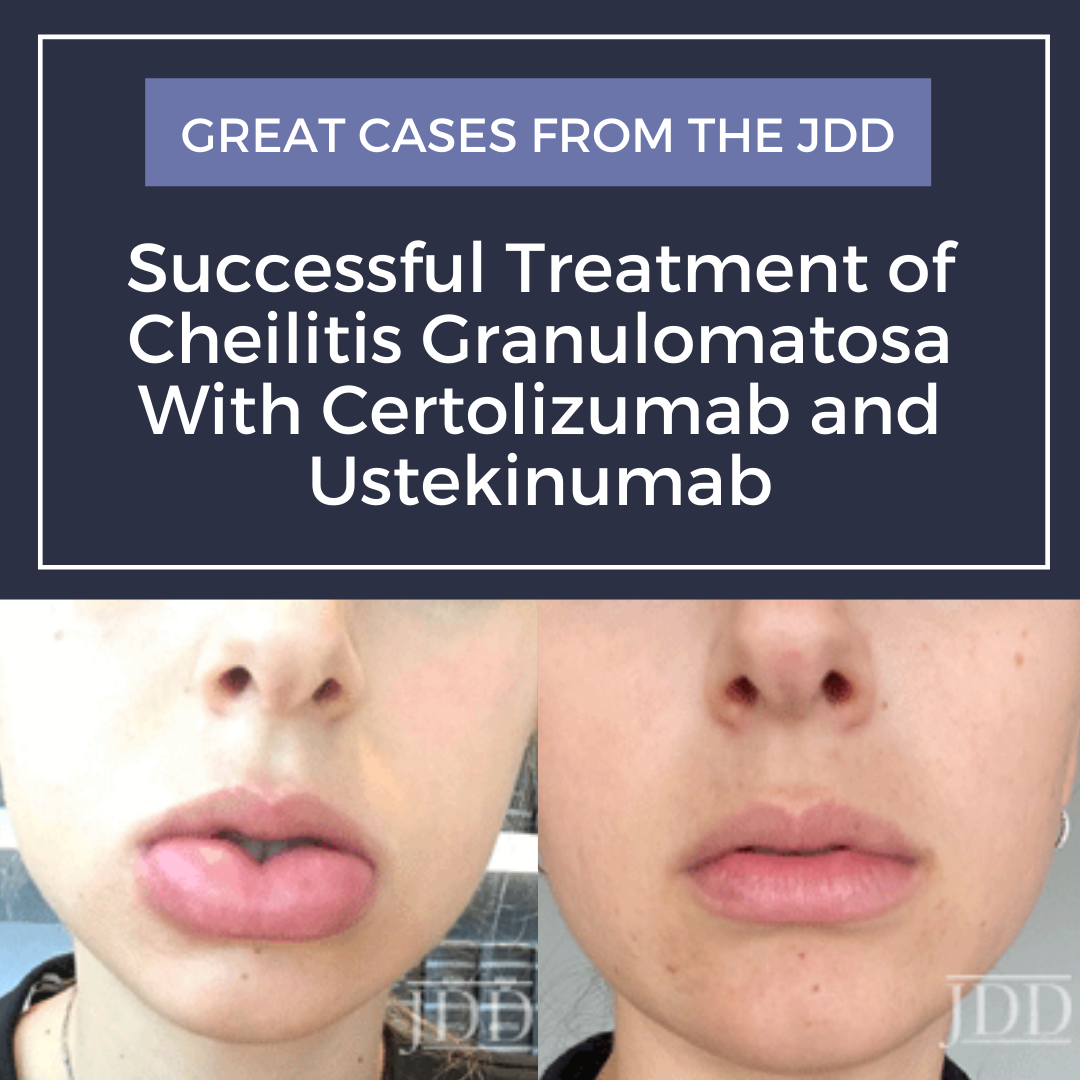INTRODUCTION
CASE


JDD authors Dana Karson , Nahla Shihab MD, Rachel Printy PA-C, and Mark Lebwohl MD report the case of a 27-year-old Caucasian woman with a long history of ulcerative colitis (confirmed to not be Crohn’s by multiple annual colonoscopies) and psoriasis vulgaris who presented to an outside dermatology office with edema of her bilateral lips, oral mucosal ulcerations, cheek and jaw swelling, and regional cervical lymphadenopathy. The patient at this time was on adalimumab for her ulcerative colitis. A skin biopsy of her lip revealed collections of histiocytes consistent with an early phase of cheilitis granulomatosa. She was treated with six days of methylprednisolone but had only marginal improvement. She was then instructed to use topical tacrolimus twice daily on her lips.
After two months without much improvement, however, the patient came to their clinic for a second opinion. Upon physical examination there was marked edema of her lower lip (Figure 1). With approval from her gastroenterologist, they switched her from adalimumab to certolizumab 400mg every two weeks.
After three months of treatment, she had significant improvement (Figure 2) and was back to her baseline level of lip fullness and no longer suffered from any oral ulcerations or lymphadenopathy. The patient maintained this improvement for six months but was then changed over to ustekinumab at the request of her gastroenterologist to better control her ulcerative colitis. She has since remained stable and in remission from her cheilitis granulomatosa on ustekinumab for over a year.
Cheilitis granulomatosa is a rare, painless, idiopathic swelling of the lip (or lips), found in only 0.08% percent of the general population.2 While orofacial granulomatosis can conceal underlying Crohn’s disease,4 our patient had had a recent colonoscopy and many prior confirming her disease was consistent with ulcerative colitis. There is no standard treatment for CG and its mechanism of disease is not well understood. It is speculated that a random influx of inflammatory cells is responsible, rather than a specific antigen.1 CG is often treated with oral, intralesional or topical corticosteroids, but other agents including metronidazole, tetracyclines, clofazimine, roxithromycin, and adalimumab have been used. Since infiltration of the lip with inflammatory cells occurs in CG, the anti-TNF agent certolizumab was initially considered for our patient as she had already been on adalimumab when her symptoms first appeared. Certolizumab is a pegylated humanized antibody Fab’ fragment of tumor necrosis factor alpha (TNF-alpha) monoclonal antibody. Certolizumab binds to and selectively neutralizes human TNF-alpha activity, thus it is indicated for inflammatory and autoimmune diseases. Ustekinumab, a monoclonal antibody blocking interleukins 12 and 23, also worked well for this patient and has been shown to treat granulomatous cheilitis in a prior case report.6 Both certolizumab and ustekinumab may be good treatment options for persistent cheilitis granulomatosa not responsive to traditional therapies.
DISCLOSURES
Dana Karson and Nahla Shihab have no conflict of interest to report. Rachel Printy has done consultant work in the past for Regeneron and UCB, Inc. Mark Lebwohl is an employee of Mount Sinai and receives research funds from: Abbvie, Amgen, Arcutis, Avotres, Boehringer Ingelheim, Dermavant Sciences, Eli Lilly, Incyte, Janssen Research & Development, LLC, Ortho Dermatologics, Regeneron, and UCB, Inc.
Dr. Lebwohl is also a consultant for Aditum Bio, Almirall, AltruBio Inc., AnaptysBio, Arcutis, Inc., Arena Pharmaceuticals, Aristea Therapeutics, Arrive Technologies, Avotres Therapeutics, BiomX, Boehringer-Ingelheim Brickell Biotech, Bristol-Myers Squibb, Cara Therapeutics, Castle Biosciences, Corrona, Dermavant Sciences, Dr. Reddy’s Laboratories, Evelo Biosciences, Evommune, Inc., Facilitatation of International Dermatology Education, Forte Biosciences, Foundation for Research and Education in Dermatology, Helsinn Therapeutics, Hexima Ltd., LEO Pharma, Meiji Seika Pharma, Mindera, Pfizer, Seanergy, and Verrica.
REFERENCES
2. El-Hakim M, Chauvin P. Orofacial granulomatosis presenting as persistent lip swelling: a review of 6 new cases. J Oral Maxillofac Surg. 2004;62(9):1114-7.
3. van der Waal RI, Schulten EA, van de Scheur MR, Wauters IM, Starink TM, van der Waal I. Cheilitis granulomatosa: a review. J Eur Acad Dermatol Venereol. (2001) 15:519.
4. Lauritano D, Boccalari E, Di Stasio D, Della Vella F, Carinci F, Lucchese A, Petruzzi M. Prevalence of oral lesions and correlation with intestinal symptoms of Inflammatory Bowel Disease: a systematic review. Diagnostics (2019) 9:3:77-95.
5. Certolizumab pegol (Cimzia) summary of product characteristics [Internet]. [cited 2019 October 10]. Available from: Drugs.com.
6. Taxonera C, Rey E. Recurrent granulomatous cheilitis associated with Crohn’s disease successfully treated with ustekinumab: case report and literature review. Therap Adv Gastroenterol. 2020; 13: 1756284820934327.
SOURCE
Karson, D., Shihab, N., Printy, R., & Lebwohl, M. (2022). Successful Treatment of Cheilitis Granulomatosa With Certolizumab and Ustekinumab Journal of Drugs in Dermatology: JDD, 21(3), 317.
Content and images used with permission from the Journal of Drugs in Dermatology.
Adapted from original article for length and style.

